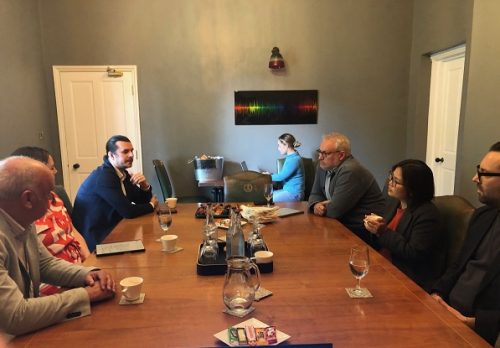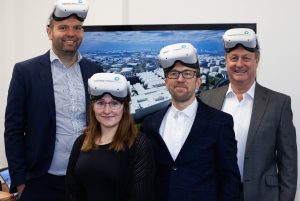Round table report: What’s next for AI and technology in education?

The ed tech sector is booming, with digital solutions now embedded into almost every aspect of school and university life.
From streamlining communication, to enabling greater flexibility around how the curriculum is delivered, the sector is evolving at pace. However, running parallel to this is discussion around the potentially negative consequences of new technologies. From questions around child online safety, to how generative AI may enable students to submit work that is not their own and actually hinder learning, the sector needs to balance a number of considerations.
Our panel was:
Chris Green, Full3sixty
Emma Slater, Access Education
Cato Rolea, Global Education Expert
Phil Wood, Nottingham Trent University
Lili Zhu, FounderX
Stuart Samuels, Nottingham Trent University
Niloufar Zarin, Thrive Learning
The roundtable hosted in partnership with digital marketing and PR agency, Tank, kicked off by asking, how long has AI been a feature of ed tech?
Emma Slater, head of education at Access Education highlighted the fact that AI as a concept is actually much older than most people think. She added: “What’s new is Generative AI and that’s what’s making a huge impact not only across the ed tech landscape but also in the classroom, across both primary and secondary education. I’d say there’s a few companies at the forefront of its development but on the whole the ed tech market in schools remains quite traditional when compared to higher education.
Chris Green, operations director at Full3sixty thinks that as new technologies become more common in schools, teacher pedagogy will need to adapt. He said: “As new technologies are developed and rolled out, teacher pedagogy will also need to evolve. Schools need to be willing to invest money and time, appointing and training digital champions. These members of staff will take responsibility for the new tools, understand the technology, how it works and where it can be applied – otherwise it won’t make an impact.”
Phil Wood, professor of education in the Nottingham Institute of Education at Nottingham Trent University emphasised the importance of giving educators the tools that they really need. He said: “I’d argue that ed tech traditionally suffers as it’s driven by technologists and it doesn’t necessarily provide teachers with the tools they most need, such as pritt sticks or tactile learning tools.”
Lili Zhu, founder at PartnerX replied: “Technology should be developed and implemented with the aim of solving a problem. No matter how good or innovative the product is, if it doesn’t solve a problem it won’t make an impact.”
Are we seeing a similar set of challenges and problems across higher education?
Stuart Samuels senior learning designer, Nottingham Trent University explained what students tell him when he asks them what matters to them: “When I speak to students and ask them what they actually want from technology and online learning, the most common answers are ‘consistency’, ‘having everything labelled correctly’ and ‘systems working as they should.’ We need to be getting these basics right before we start spending significant amounts of time and money on the latest technologies.”
Cato Rolea, digital transformation in global education expert, highlighted the impact of the COVID-19 pandemic in bridging the gap between IT teams and educators: “Now the whole digital spectrum has changed and we’re seeing more instances of partnerships between those who will be using the technology and IT departments. This is definitely a step in the right direction.”
How important is AI adoption in education to the UK government?
Zhu thinks it’s a global race towards technology and of course there’s immense risk in terms of the ethical implications of AI. However, we need to learn to embrace this risk as you can’t put the genie back in the bottle once it’s out. AI isn’t going away.”
What’s the incentive for teachers to adopt these new technologies?
Slater argued that the incentives for schools and teachers are two very different things: “If we shift the conversation to operational then there’s huge incentives for schools. Projecting budgets, forecasting, amending policy quickly. It’s an area hiding in plain sight as we know that schools aren’t always working in the most efficient way and the government should be focused more on this. For teachers, the incentives are different. The average teacher uses seven products in a day, yet the average teacher only teaches six classes per day so that’s at least one product per class. There’s the mandated products that they have to use, so there’s a lot of noise.
“The question needs to be around how schools can create training opportunities, and help the teacher to see the true value in certain technologies. I’m not sure that anyone is getting that exactly right.
Niloufar Zarin agreed that the impact on teachers needs to be more of a priority: “What I’ve seen is that there’s a big focus on everything else except how we can help teachers. Focus needs to be on the user experience, yet very few people think about the impact on actual teachers. Often the intelligent products are the simplest ones. Has there been any research into what teachers actually need and what they’d benefit the most from? This situation really needs addressing.”
Read a full summary of the discussion here.









